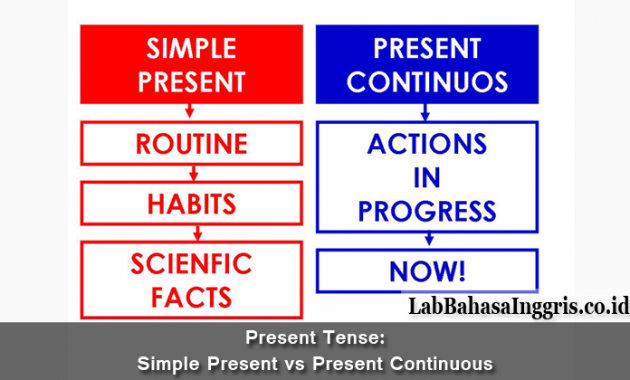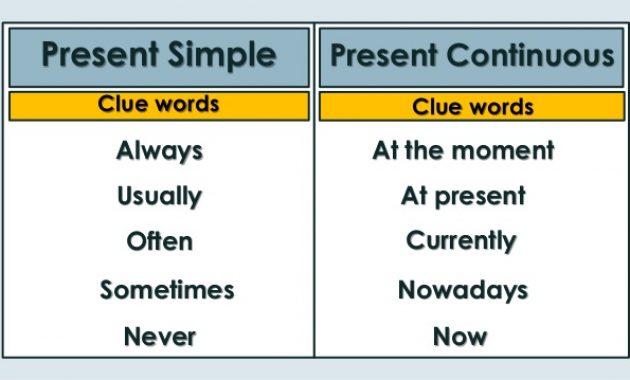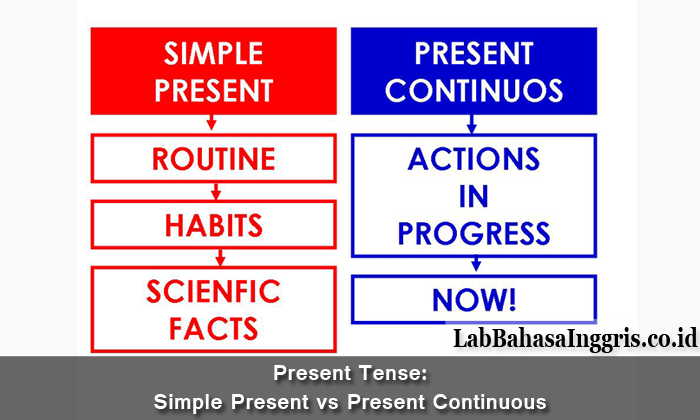LabBahasaInggris.co.id – Artikel hari ini saya akan memberikan beberapa informasi tentang Perbedaan antara Simple Present dan Present Continuous.
Yuk, kita simak bersama…
Table of Contents
Present Tense: Simple Present vs Present Continuous

Perbedaan antara Simple Present dan Present Continuous
A. We use the Present Continuous Tense for actions happening at the time of speaking.
- Look! It is snowing.
- Listen, Katie is singing in the bathroom.
- The water is boiling. Can you turn off the stove?
- Let’s go out. It isn’t raining anymore.
- Don’t disturb me. I’m busy… Why? What are you doing?’
- I’m going to bed, goodnight.
- Listen to those people. What language are they speaking?
- Maria is in class at the moment. She’s taking an exam.
Pada contoh di atas kegiatan, aksi, atau tindakan terjadi pada saat berbicara.
Pertanyaan: “Apakah kita dapat menggunakan Simple Present untuk tindakan yang terjadi pada saat berbicara?”
Jawab: “TIDAK, jika kalian menggunakan Simple Present untuk tindakan yang terjadi pada saat berbicara, kalian akan melanggar aturan dari tenses itu sendiri. Lihat pembahasan di bawah ini!”
B. We use the Simple Present Tense for habits or general activities.
- It snows here every winter.
- Sean always sings in the bathroom.
- We usually get up at seven o’clock.
Kita dapat menggunakan Simple Present Tense untuk kebiasaan atau kegiatan rutinitas/ sehari-hari.
[su_box title=”Read More” style=”default” box_color=”#333333″ title_color=”#FFFFFF” radius=”3″ class=””]Daily Activities: Kegiatan Sehari-Hari Seorang Siswa Dalam Bahasa Inggris[/su_box]
C. We normally do not use these verbs in the Present Continuous.
- think
- want
- like
- love
- hate
- need
- prefer
- depend
- know
- mean
- understand
- believe
- remember
INGAT! Beberapa pilihan kata di atas tidak dapat digunakan ke dalam bentuk Present Continuous secara normal.
- I think you are right.
- She wants a new bike.
- Matt likes his job.
- I don’t understand you. What do you mean?
- She hates math.
- I like it very much.
- Do you know his name? No, I don’t know his name.
D. We use the Present Progressive for a routine or situation that we see as temporary, for a short period.
- I’m living with some friends until I find an apartment.
- You’re working hard today. Yes, I’ve got a lot to do.
Perhatikan contoh kalimat di atas!
- I’m living with some friends until I find an apartment.
Saya tinggal bersama beberapa teman sampai saya menemukan apartemen.
Perhatikan “until/ sampai” (bergaris bawah) artinya apa?
Dengan adanya kata “until” kita dapat menggunakan Present Progressive untuk kegiatan yang sementara atau dalam periode singkat, bukanrutinitasatau punkebiasaan.
E. We use the Simple Present for a routine or situation that we see as permanent.
- I work at a sports bar. (It is a permanent job.)
- They live in a very nice house.
Pada bagian B sudah dijelaskan, jika mengekpresikan kebiasaan, kegiatan rutinitas, atau sesuatu yang permanen, kita dapat menggunakan Simple Present.
F. When we use the Present Continuous Tense with “always” the sentence has a meaning of “too often/ too much” and this annoys the speaker.
- John is always inviting his friends over. (He does it all the time and it annoys me.)
John always invites his friends over. (neutral) - I’m always making silly mistakes.
I make silly mistakes too often and I hate it.
Hindarkan! menggunakan kata “always” dalam pola Present Continuous Tense. Karena hal itu kurang tepat dan terasa aneh. :p
Pertanyaan: “Lalu bagaimana jika saya ingin menggunakan kata “always” yang maksudnya selalu atau sepanjang waktu?”
Jawab: Jika kalian ingin menggunakan kata “always” maka gunakan lah pola Present Simple seperti penjelasan di bawah ini!”
G. Always with the Present Simple means ‘all the time’
- I always take the bus to work. (I do it all the time.)
- We always play computer games after school.
- I always pray before I sleep.
Penggunaan kata “always” diikuti dengan kata kerja pertama/ V1 bukan V-ing.

[su_box title=”Read More” style=”default” box_color=”#333333″ title_color=”#FFFFFF” radius=”3″ class=””]100 Contoh Soal Present Continuous Tense Lengkap Dengan Jawaban[/su_box]
Demikian Perbedaan antara Simple Present dan Present Continuous.
Semoga artikel ini memberikan jawaban, kapan kalian harus menggunakan Simple Present dan kapan harus menggunakan Present Continuous.
Jangan lupa berbagi kebaikan dengan share artikel ini kepada teman-teman kalian ya guys… Good Luck!
